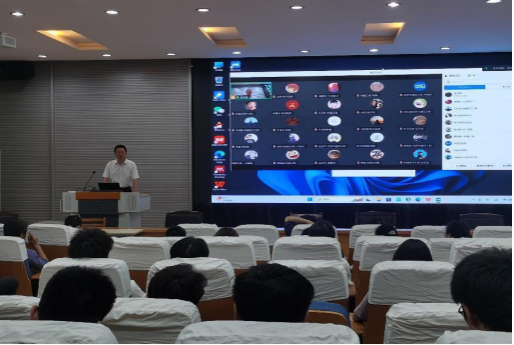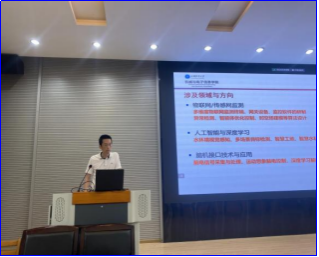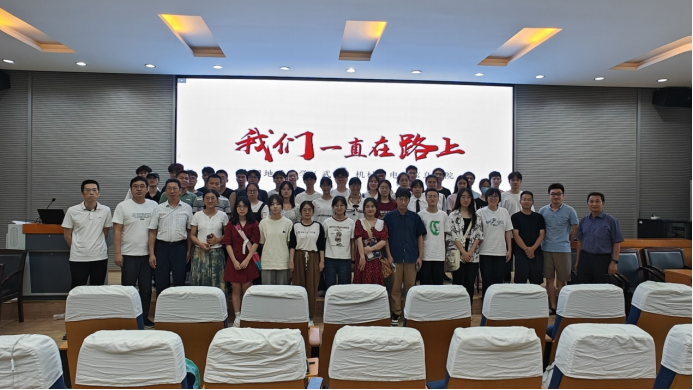On the afternoon of June 28th, the School of Mechanical Engineering and Electronic Information held the 9th school open day for 2024 postgraduate admissions and student meet & greet in Room 301 of No. 2 Teaching Building, which attracted nearly 100 junior students from CUG and other universities.
Prof. Li Bo, deputy dean of the School, delivered a welcome speech. He shared with the students the meaning of postgraduate studies and the key qualities required for doing research well with his years of teaching and research experience, and he sincerely welcomed the students to apply for the graduate programs of CUG. After the opening ceremony, the School organized activities in different venues for different disciplines, mainly including supervisor presentation, cutting-edge lectures, open laboratory visits, and teacher-student exchanges.

The presentation was divided into three venues, all of which were held in a combination of offline and online.
The campus open day event at the venue for Mechanics and Mechanical Engineering (Room 303 of No. 2 Teaching Building) was hosted by Prof. Mei Shuang, deputy director of the Department of Mechanical Engineering. Teacher representatives included Han Guangchao, Cao Wen’ao, Cheng Siyi, Yang Wenjian, Yao Xiangyu, Liu Xingyue, Tu Xin, and Ding Tengfei. Firstly, Mr. Han Guangchao, secretary of the Party Branch of the Department of Mechanical Engineering, talked about the development history of the Department of Mechanical Engineering, as well as the research directions, research results and the construction of teaching staff, which gave the students a deeper understanding of the Department of Mechanical Engineering of China University of Geosciences (Wuhan). Immediately afterwards, teacher representatives from each research field gave a more detailed presentation of their team’s research work.

The campus open day event at the venue of Information and Communication Engineering and Electronic Information (Room 301 of No. 2 Teaching Building) was hosted by Mr. Wu Zhichao, deputy director of the Department of Electronic Information Engineering, and the teacher representatives present included Hao Guocheng, Yi Ying, Wang Yong, Wang Jiahao and Ma Li.
Firstly, Prof. Hao Guocheng, head of the Department of Communication Engineering, introduced the development history and current situation of the degree program to the students. Then Mr. Wang Jiahao, as a teacher representative in the research field of signal and information processing, introduced his team’s research progress in noise analysis and modeling of inertial sensors in gravitational wave detection, modulation identification of non-cooperative communication radar signals, electronic countermeasures design, anomaly detection and stratigraphic structure identification of geological signals in various complex terrains, detection analysis and processing of non-implantable brain-computer interface signals, etc. Mr. Yong Wang, representing the research field of communication and information system, introduced the research progress of cognitive Internet of Things, wireless sensor network, next generation communication technology, evolving antenna, and modern digital system design to the students. Mr. Wu Zhichao, representing the research field of optoelectronic devices and systems, introduced key technologies such as semiconductor fiber design and application, integrated optoelectronic sensing chip, ultrafast fiber laser, distributed fiber sensing, and coherent optical communication. Ms. Ma Li introduced her team’s research results in remote sensing image analysis and machine learning algorithms, and Mr. Yi Ying introduced the cutting-edge applications of flexible sensors.


The campus open day event at the venue of Design and Art Design (Room 407 of No. 2 Teaching Building) was hosted by Xu Jie, deputy director of the Department of Mechanical Engineering, and the teacher representatives included Chen Xiaoli, Xiao Chang and Yang Zhan. First, Ms. Xu Jie briefly introduced her academic background and work experience, as well as her main research fields, including intelligent design and manufacturing, topology optimization design, etc., and briefly elaborated on the future application areas and interdisciplinary intersection. Then, Ms. Chen Xiaoli introduced herself briefly, gave a brief summary of her past research work, introduced and explained her work on human factors research, user research, experience design, equipment design and brand building, and made a brief request for future graduate students, hoping that students who love design would join the team. Ms. Xiao Chang introduced her research fields, mainly engaged in the research of human-computer interaction of intelligent products. Her horizontal project is mainly instrumentation and geological equipment design, while the vertical project is mainly interaction design evaluation and assessment research. Students’ research fields are generally divided into two major categories, with engineering-based students doing hardware interaction design research and art-based students doing software interaction design research. Finally, Mr. Yang Zhan introduced his research fields, he is mainly engaged in structural simulation and optimization design; at present, he takes the common drill bits in geological equipment as the research object and explores the best morphology or optimal topology of the drill bit structure through simulation analysis and optimization algorithms. On this basis, further multi-physics field coupling simulation is carried out to simulate the mutual influence of multiple physical fields simultaneously, providing a more comprehensive analysis for the design and optimization of complex systems.

After each presentation, the students interacted with the teachers online and offline; the teachers enthusiastically answered some of the students’ questions in detail and welcomed them to continue their studies at CUG in the future. (Reported by Liu Xingyue, Wu Zhichao, Xu Jie and Li Jie)
